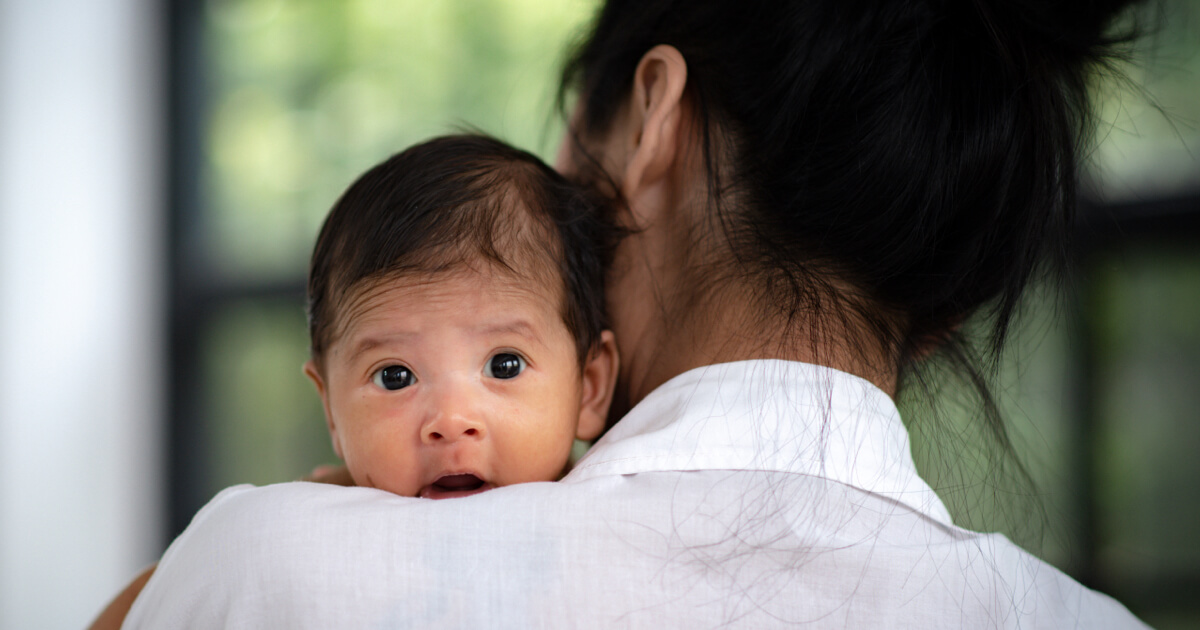Postnatal care Perth


- At Joondalup Obstetrics and Gynaecology Group we organise two postnatal appointments in the first 6 weeks after childbirth
- It’s an excellent opportunity to address problems early on
- ‘Baby blues’ is not the same as postnatal depression
- Pelvic organ prolapse is common and it’s important to seek help early on
- Vaginal bleeding after childbirth is normal, but if the bleeding suddenly gets heavier this may be a sign that something is not right
Joondalup obstetrician for postnatal care
The importance of postnatal care
Postnatal care and checkups with your obstetrician are key opportunities to make sure new mums stay healthy. This critical “fourth trimester” —the time of recovery after giving birth— is an opportunity to set the stage for a new mum’s best possible health, now and in the future.
It’s a massive responsibility to care for your newborn and it’s normal to feel tired and anxious and in some cases even be in pain. That’s why we believe that postnatal care is critical to improving your life and that of your family.

Obstetrician Perth
We find it is challenging to get through everything in 30 minutes. That’s why we like to see you twice. It’s an excellent opportunity to show off your baby as well as ask burning questions or discuss what is important to you.

Obstetrician Perth
During these postnatal visits at our Joondalup practice, we will assess your physical, mental and emotional health. There will be a physical and pelvic examination to ensure you have healed completely from childbirth.
You will be asked questions about common problems such as:
- Depression and anxiety
- Feeding and newborn care
- Poor sleep, fatigue
- Bleeding
- Problems urinating
- Emotional support
You will also discuss your sexual health such as:
- When is it safe to resume sexual activity and if this is painful or uncomfortable
- What sort of birth control you would like to use if any
- Timing of future pregnancies and mode of delivery
It is also an opportunity to learn about potential future problems and how to prevent them such as:
- Diabetes
- High blood pressure
Yes, your partner is always welcome and encouraged to attend.
Signs of postnatal depression
Giving birth and the time just after your child is born, is supposed to be a time of joy and happiness. But not for everyone. In Australia, about one in seven women get postnatal depression after giving birth.
‘Baby blues’ is not postnatal depression
That’s right. Many women experience ‘baby blues’ two or three days after they have given birth. Common symptoms are:
- Feeling anxious, depressed or upset
- Crying for no clear reason
- Having trouble eating, sleeping or making clear decisions
- Feeling angry with the new baby, partners or other children
These symptoms are quite normal and usually get better within 1-2 weeks without treatment. When you experience ‘baby blues’ it does not mean that you are clinically depressed.
Postpartum natal depression (PND) explained
Postpartum natal depression (PND) is more serious and can occur up to one year after childbirth. PND often starts within one or two weeks after birth.
Women often experience very intense feelings of sadness, anxiety and/or despair and are unable to perform their daily tasks.
It is probably caused by a variety of factors such as:
- Changes in hormone levels
- Prior history of depression
- Emotional factors
- Fatigue
- Lifestyle factors
If you or your family members suspect that you may have PND it is important that you seek help as early as possible. Please don’t wait for your postnatal appointment and book a consultation at our practice in Joondalup straight away.
A diagnosis can be made by your obstetrician, GP, psychologist or psychiatrist.

Vaginal prolapse Perth
Pelvic organ prolapse, the elephant in the room
Unfortunately, pelvic organ prolapse (POP) is not talked about much. However, it’s real and in Australia, it is estimated at least half of women who have had more than one child have some degree of pelvic organ prolapse.
The pelvic organs, which include the vagina, uterus, bladder, and bowel, are held in place by the pelvic floor muscles. When one of these pelvic organs sags and bulges or protrudes in the vagina, we call this pelvic organ prolapse. Childbirth is the main cause of POP.
Symptoms may vary from the organ protruding from the vagina, leaking urine during intercourse or vaginal noises during sex.

Obstetrician Perth
Best treatment options for pelvic organ prolapse
Treatments vary and need to be patient-specific but include:
- Pessaries: These often help with symptoms of bulging or urinary dysfunction; they are simple devices that require little care.
- Pelvic floor exercises: Kegel exercises can help strengthen muscles of the vagina, urethra and rectum. Unfortunately, they are often done wrong and make things worse. We recommend consultation with a pelvic floor physiotherapist to be taught how to perform these correctly.
- Surgery: When POP significantly impacts your quality of life, we may recommend surgery.
Information about the various types of repair surgery can be found on the Urogynaecological Society of Australasia website.
What if I do nothing?
You may decide not to have any treatment. Some women decide to have treatment when the prolapse worsens. Meanwhile, we recommend doing things such as:
- Adding fibre to your diet and drinking lots of water
- Losing weight
- Exercising regularly, especially exercises that build core body strength such as yoga and pilates
Lochia management
How long will I bleed after birth?
Vaginal bleeding, also called lochia, is completely normal after giving birth.
It doesn’t matter whether you gave birth vaginally or via caesarean section, bleeding will occur after birth. It gradually reduces every day, going from bright red to pink and then brown/creamy in colour. For most women, this will cease between 4 and 6 weeks post-birth.
It can also be heavier in the morning when you get up for the first time, after breastfeeding or after exercising.
If your bleeding gets heavier suddenly this may be a sign that something is not right.

Obstetrician Perth
Common reasons for this include:
- Placental tissue remaining in your womb after birth
- Injury to the vagina cervix or uterus
- Infection
Please contact us immediately if your bleeding worsens or if you experience prolonged bleeding.
Yes, there is an increased risk of bleeding again. It is important to discuss this early with your obstetrician as they will be able to plan ahead and reduce the risk of this happening again.
It may also be an opportunity to do a full medical assessment for any conditions that will make you more likely to bleed.
Preterm birth Joondalup
Postnatal care for mums and families of preterm infants
Preterm birth is the birth of a baby before 37 weeks.
Often, your baby will stay in the neonatal intensive care unit, which can be very stressful for families. The care needed will depend upon how early your baby is born. For example, some babies may stay a few hours in NICU, others several months.
Having a child in the neonatal intensive care unit can be a very stressful time for a family and we are here to help.

Obstetrician Perth
It is important to recognise the strain and seek help early with issues such as depression & anxiety.
There are also support networks & online groups with families who have been through the NICU. These can be very helpful and we will happily provide some pointers for your consideration.
12 excellent reasons to choose Joondalup Obstetrics and Gynaecology Group
Care for the whole family, organising work certificates for partners.
Providing safe care and birth options (experience as a rural GP obstetrician).
A limited number of private patients to allow us the ability to provide patients with the service they deserve.
Make the time for patients, understand what they want/expect from their journey, available 24/7 (when on leave you will be covered during those times).
Blood pressure management.
Foetal growth assessment.
Maintaining a close relationship with your GP.
In-house access to allied health services such as physiotherapy and lactation consultants.
Free online antenatal classes.
About
JOGG
We are Joondalup Obstetrics and Gynaecology Group, in short JOGG. We are a Joondalup-based private obstetrics and gynaecology practice, and cater for mums, women and families across the Perth metro area.
Postnatal care information
More FAQs about postpartum care
Yes, your postnatal check will include a comprehensive baby check as well.
Yes, Ramsay Health and Joondalup Private Maternity in particular offer a host of services to assist in the postnatal window.
It is possible to fall pregnant again very soon after childbirth. It is usually a good idea to wait at least 18 months between babies.
If you are not breastfeeding, ovulation can occur within a few weeks after birth. This may be delayed up to 6 months if fully breastfeeding.
The choice of contraception type is influenced by the timing of commencement, if you are breastfeeding and the effectiveness of the method chosen
Options include:
- Long-acting reversible contraceptives (LARCS) such as the intrauterine device (Hormonal and non-hormonal) or progesterone implant
- Combined hormonal methods such as pills, rings or patches
- Breastfeeding as birth control
- Barrier methods (condoms, diaphragm, cervical caps)
- Progesterone only methods (Pills and injections)
Sterilisation
These contraception options will be discussed with you at your postnatal appointments
Yes, it is normal to feel this way. Most babies will be treated successfully and develop normally.
It is important to learn as much as possible about the treatment of the condition and get support from experienced health professionals and other parents that have been in a similar situation.
I recommend reading the British Medical Associations’ award-winning guide to Baby Hip Development for more detailed information and visiting stepsworldwide.org for more valuable resources
Above all it is really important to engage with the neonatal care team to achieve the best outcomes for your baby.
Please contact our Joondalup practice as soon as you are concerned. We will see you on the same day or the day after.
Your wound should gradually get better every day. Any new pain, bleeding, itching, swelling or redness needs to be examined promptly.
Breastfeeding is a natural process and only a few women cannot breastfeed because of medical conditions or other problems.
It is important to seek help early on and there is lots of help available. We will put you in contact with a lactation consultant prior to the birth of your baby and you may continue to use her services afterwards.
Vomiting after breastfeeding is a very common concern and is often a normal part of a baby’s development. This is because the sphincter between the stomach and the oesophagus (the tube from the mouth to the stomach) is not as strong as it will eventually become as the baby matures.
If it persists or is associated with other symptoms such as diarrhoea then you must seek medical help immediately.
If the vomiting is:
- Projectile-like/forceful
- Green or blood-stained
- If your baby seems overly distressed or lethargic
These may be signs of a problem and you should seek help.
This can be normal. There are many factors that impact sexual intimacy after childbirth and it is important to realise that there is more to intimacy than sex, especially when adjusting to the new member of the family.
It is also important to be watchful for signs of postnatal depression. Signs such as severe mood swings, loss of appetite, overwhelming fatigue and a loss of general joy in life should alert you to seeking professional help.
Jaundice is one of the most common medical conditions requiring intervention in the newborn. It affects up to 60% of term and 80 % of preterm babies.
It is a sign of elevated bilirubin levels in the blood and the baby presents with a yellowish appearance.
Jaundice that peaks in the 3rd to 5th days of life is usually physiological but your neonatal team will always do a careful assessment for any pathological causes.
Most babies with benign causes will respond to phototherapy (“being under the lights”). Occasionally in severe cases medications or an exchange transfusion is required.
Please follow this link for recommended immunisations after birth.